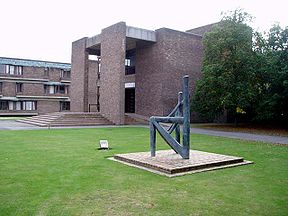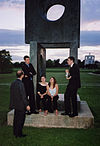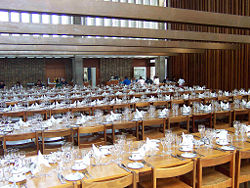- Churchill College, Cambridge
-
Coordinates: 52°12′45″N 0°06′13″E / 52.21259°N 0.10360°E
Colleges of the University of Cambridge
Churchill College
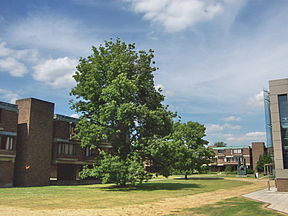
Named after Sir Winston Churchill Established 1958 Admittance Men and women Master Sir David Wallace Undergraduates 440 Graduates 210 Sister college Trinity College, Oxford Location Storey's Way (map) 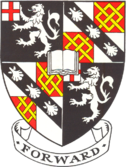
"Forward" College website Boat Club website Churchill College is a constituent college of the University of Cambridge, England.
In 1958, a Trust was established with Sir Winston Churchill as its Chairman of Trustees, to build and endow a college for 60 fellows and 540 Students as a national and Commonwealth memorial to Winston Churchill; its Royal Charter and Statutes were approved by the Queen, in August, 1960.[1] It is situated on the outskirts of Cambridge, away from the traditional centre of the city, but close to the University's main new development zone. Its 160,000 m² (42 acres) of grounds make it physically the largest of all the colleges.
Churchill was the first all-male college to decide to admit women, and was among three men's colleges to admit its first women students in 1972.[2] Within 15 years all others had followed suit. The college has a reputation for relative informality compared to other Cambridge colleges, and traditionally admits a larger proportion of its undergraduates from state schools.
The College Motto is "Forward". It was taken from the final phrase of Winston Churchill's first speech to the House of Commons as Prime Minister - his famous "Blood, Toil, Tears and Sweat" speech - in which he said "Come, then, let us go forward together".[3]
Cambridge University Radio is broadcast from Churchill College.
Contents
History
In 1955, on holiday in Sicily soon after his resignation as Prime Minister, Winston Churchill discussed with Sir John Colville and Lord Cherwell the possibility of founding a new institution. Churchill had been impressed by MIT and wanted a British version, but the plans evolved into the more modest proposal of creating a science- and technology-based college within the University of Cambridge.[4] Churchill wanted a mix of non-scientists to ensure a well rounded education and environment for scholars and fellows. The college therefore admits students to read all subjects except Land Economy and Theology & Religious Studies (though it is possible to switch to these subjects later).
The first postgraduate students arrived in October 1960, and the first undergraduates a year later. Full College status was received in 1966.
The bias to science and engineering remains as policy to the current day, with the statutes requiring approximately 70% science and technology students amongst its undergraduate intake each year. The college statutes also stipulate that one third of junior members of the college should be advanced (postgraduate) students.
Buildings
In 1958, a 42 acre (170,000 m²) site was purchased to the west of the city centre, which had previously been farmland. After a competition, Richard Sheppard was appointed to design the new college. Building was completed by 1968 with nine main residential courts, separate graduate flats and a central building consisting of the dining hall, buttery, combination rooms and offices.
The dining hall is the largest in Cambridge. It measures 22m square, 9m to the base of the vault beams, and 11.6m to the highest point. It can cater for up to 430 guests in a formal dining arrangement.
In the centre of the college is the Churchill Archives Centre, opened in 1974 to provide a home to Sir Winston’s papers (and also more recently endowed with papers from former Prime Minister Margaret Thatcher and Neil Kinnock) alongside those of eminent scientists and engineers, including Reginald Victor Jones, Rosalind Franklin and Sir Frank Whittle.[5]
In 1992, The Møller Centre for Continuing Education[6] was built on the Churchill site, designed by Henning Larsen.
Chapel
At the farthest end of the college is the Chapel. The idea of having a religious building within a modern, scientifically-oriented academic institution deeply annoyed some of the original fellows, leading to the resignation of Nobel Prize winner Francis Crick in protest.[7] Eventually a compromise was found: the chapel was sited just to the west of the Sheppard Flats,[8] and funded and managed separately from the rest of the College itself, being tactfully referred to as "the Chapel at Churchill College". The chimney of the heating system at the front of the college substitutes visually for the missing chapel tower.
Crick had agreed to become a fellow on the basis that no chapel be placed at Churchill. A donation was later made by Lord Beaumont of Whitley to Churchill College for the establishment of one, and the majority of fellows voted in favour of it. Crick claimed that Winston Churchill wrote to him saying that no-one need enter the chapel unless they wished to do so, and therefore it did not need to be a problem. Crick, in short order, replied with a letter accompanied by a cheque for 10 Guineas saying that, if that were the case, the enclosed money should be used for the establishment of a brothel. This story was repeated by Crick in an interview with Matt Ridley (Crick's biographer[9]), quotes from which are reported in the Daily Telegraph.[10]
Masters
The Mastership of Churchill College is a Crown appointment. To date the College has had six Masters:
- Sir John Cockcroft, (Master 1959–1967), Nobel Laureate in Physics, who split the atom.
- Sir William Hawthorne (Master 1968–1983), who helped develop the jet engine.
- Sir Hermann Bondi (Master 1983–1990), cosmologist who helped develop the Steady State theory of the universe.
- Sir Alec Broers (Master 1990–1996), nanotechnologist (left to become Vice-Chancellor, University of Cambridge).
- Sir John Boyd (Master 1996–2006), formerly British ambassador to Japan, 1992–96.
- Sir David Wallace (Master 2006[11]-present), previously Vice-Chancellor of Loughborough University and is now also Director of the Newton Institute.
Events
Every week of the Michaelmas and Lent terms, Churchill is host to Pav, a weekly music event unusual for Cambridge events in that it is free and open to all university members. (The name Pav originates from the pavilion buildings of the college where the event was originally held. Since 1992, Pav has been held in the main bar area.) The college funds sports clubs and societies which provide entertainment for students. In the early years of the college’s foundation, the college held a ball in May Week, in common with many older colleges. However, more recently Churchill has held a Spring Ball every February. Past themes have included The Seven Deadly Sins (2011), A Hard Day's Night (2010), Tokyo: The Neon Sunrise (2009), Great Ball of Fire (2008), Back in the Day (2007), Karishma (2006), Showdown (2005), Arabian Nights (2004), Hakuna Matata (2003) and Ocean Bound (2002). The Ball has hosted a number of upcoming bands, such as The Wombats (2007) and The Noisettes (2008). During May Week the JCR organise a free garden party. The event hosts performances from local bands and musicians, but has also hosted Man Like Me.
Students of the College run Churchill Casino,[12] a Cambridge based enterprise which provides professional casinos at various social events. Churchill Casino is frequently hired for Cambridge May Balls as well as balls at the University of Oxford and corporate events throughout the country.
Sport
With the college fields on site, sport is an integral part of the college.
Churchill College Football Club (CCFC) are currently the only college team to ever retain the Cambridge University Amateur Football League Division 1 title, winning it in 2005-06 and 2006-07. In the 2006-2007 season they also reached the final of Cuppers.[citation needed]
Art
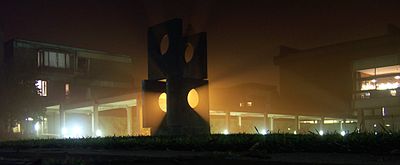 Hepworth’s Four square walk-through is large enough for many students to work and play on—which they are allowed to do
Hepworth’s Four square walk-through is large enough for many students to work and play on—which they are allowed to do
The college contains many examples of modern artwork including:
- Four square walk-through – Dame Barbara Hepworth
- Prints of Marilyn Monroe – Andy Warhol
- Gemini (1973) – Denis Mitchell
- Diagram of an Object (Second state) (1990) [13] – Dhruva Mistry
- Spiral – Michael Gillespie (1993)
- Flight – Peter Lyon (1981)
- Black Bag – Graham Murdoch (1990)
There are also works by Sir Eduardo Paolozzi, Bridget Riley, Patrick Caulfield, Sir Peter Blake, and Daphne Hardy Henrion.
Mistry’s piece can be found at the front of college. Sir Anthony Caro’s Forum [14] used to stand near it but it was removed before the start of the 2004-2005 academic year. In January 2007 its place was taken by Beast Alerted 1, a sculpture by British sculptor Lynn Chadwick.
Traditions
In special formal meals such as Matriculation Dinner or Scholars' Feast the Master usually raises a toast, first to The Queen and then to “Sir Winston". In other formal halls this is usually made by a senior student once the fellows have left. This tradition started in the early 2000s with the students customarily toasting in the reverse order - "Sir Winston", followed by "The Queen".
The tradition of pennying is widely known across all Colleges, with slightly varying rules.
Notable past and present fellows
See also Category:Fellows of Churchill College, Cambridge
- Roy Porter - Historian and prolific author
- Stephen Roskill - Naval historian
- George Steiner - Literary critic and linguistic theorist
- Correlli Barnett - Military historian
- Jacques Barzun- Historian, cultural critic; (Extraordinary Fellow at Churchill while also Provost, Dean of Graduate studies, and Dean of Faculties at Columbia.)
- Frank Hahn - Economist
- George Gamow - Cosmologist (overseas fellow)
- John Kinsella - Poet and novelist
- Piers Brendon - Writer and historian
- C. B. Macpherson - Political scientist
- Andrew Sinclair - Historian, novelist, journalist.
- C. P. Snow - Physicist and novelist
- Sir Colin St John Wilson – Architect
- Edward Bullard - Geophysicist, former head of the National Physical Laboratory
- Archie Howie - Physicist
- Richard Keynes - Physiologist
- Michael Ashburner - Biologist, former head of the European Bioinformatics Institute and the European Molecular Biology Laboratory
- Dick Tizard - Engineer
- Michael Young - Sociologist and politician
Nobel laureates (associated members and fellows)
- Francis Crick - co-discoverer of the structure of DNA, Medicine, 1962
- Kenneth J. Arrow - Economics, 1972
- Antony Hewish - co-discoverer of pulsars, Physics, 1974
- William Lipscomb - Chemistry, 1976 (overseas fellow)[1]
- Gerard Debreu - Economics, 1983
- Philip Anderson - Physics, for the behaviour of electrons in magnetic solids, 1977
- John Cockcroft - Physics, for using accelerated particles to study atomic nuclei, 1951
- Wole Soyinka - Literature, 1986 (overseas fellow)
- Eric Maskin - Economics, 2007 (overseas fellow)
- Roger Tsien - Chemistry, 2008
- Robert G. Edwards - Physiology or Medicine, 2010
- Peter Diamond - Economics, 2010 (overseas fellow)
- Mario Vargas Llosa - Literature, 2010 (overseas fellow)
Notable alumni
See also Category:Alumni of Churchill College, Cambridge
- Kari Blackburn - BBC World Service executive
- Michael Burrows - Inventor of the first internet search machine, Alta Vista
- Peter Fincham - former controller, BBC1
- Sir Christopher Frayling - writer and educationalist
- Mike Gascoyne - Chief Technical Officer of Lotus Racing
- Sir Peter Gershon - author of the Gershon Review, chairman of Premier Farnell and Symbian Ltd.
- John Gladwin - Bishop of Chelmsford and Chair of Christian Aid
- Michael Green - Lucasian Chair of Mathematics
- Roger Helmer - Conservative MEP
- Diarmaid MacCulloch - Historian
- Viscount Monckton - Writer and policy advisor to Margaret Thatcher
- Simeon Nyachae - Kenyan Minister and 2002 presidential candidate
- Brendan O'Neill - business executive
- Dr Alexandra (Alix) Pryde - BBC Controller of Distribution
- Luke Roberts - comedian
- Ian Stewart - Mathematician
- Gavin Strang - Labour MP
- Bjarne Stroustrup - inventor of C++
- Sir John Stuttard - Lord Mayor of London 2006/7
- Fabian Tassano - Economist and author
- Geoffrey Thomas - President of Kellogg College, Oxford
- Geoff Travis - Founder of Rough Trade Records label and shops
- Neil Turok - Mathematician
- Stephen Tweedie - Software Developer
- Rick Warden - Actor Band Of Brothers, Rome
- Jeremy Warmsley - musician
See also
- Churchill Scholarships for thirteen graduates from the United States.
- Churchill College Boat Club
References
- ^ "Churchill College, Cambridge - Publication Scheme". http://www.chu.cam.ac.uk/about/foi/schemes/Churchill_College_introduction_part_1_v2.pdf. Retrieved February 5, 2010.
- ^ "Dick Tizard, Obituary". The Independent (London). October 10, 2005. http://www.independent.co.uk/news/obituaries/dick-tizard-510308.html. Retrieved February 5, 2010.
- ^ "Churchill College Hospitality - About Churchill College". http://www.churchillconferences.co.uk/college.htm. Retrieved February 5, 2010.
- ^ Walsh, James Jackson (1998). "Postgraduate Technological Education in Britain: Events Leading to the Establishment of Churchill College, Cambridge, 1950-1958". Minerva 36 (2): 147–177. doi:10.1023/A:1004396018945.
- ^ "Churchill Archive Centre". http://www.chu.cam.ac.uk/archives/. Retrieved February 5, 2010.
- ^ "The Møller Centre". http://www.mollercentre.co.uk. Retrieved February 7, 2010.
- ^ "The Francis Crick Papers: Biographical Information". http://profiles.nlm.nih.gov/SC/Views/Exhibit/narrative/biographical.html. Retrieved February 5, 2010.
- ^ "Churchill College: Information: Map of College". http://www.chu.cam.ac.uk/about/visitors/map_of_college.php. Retrieved February 5, 2010.
- ^ McKie, Robin (September 17, 2006). "Observer review: Francis Crick by Matt Ridley - Books - The Observer". The Guardian (London). http://www.guardian.co.uk/books/2006/sep/17/scienceandnature.biography. Retrieved February 5, 2010.
- ^ Highfield, Roger (March 20, 2003). "Do our genes reveal the hand of God? - Telegraph". The Daily Telegraph (London). http://www.telegraph.co.uk/science/science-news/3306329/Do-our-genes-reveal-the-hand-of-God.html. Retrieved February 5, 2010.
- ^ "Appointment of Master of Churchill College". http://www.number10.gov.uk/Page8002. Retrieved February 5, 2010.
- ^ "Churchill Casino". http://www.churchillcasino.co.uk. Retrieved February 5, 2010.
- ^ "Dhruva Mistry". http://www.sculpture.org.uk/image/618830211087/43/. Retrieved February 5, 2010.
- ^ "Anthony Caro - Forum". http://www.anthonycaro.org/Gallery-Pic.asp?WorkID=2350. Retrieved February 5, 2010.
External links
- College Website
- Churchill College JCR
- Churchill College MCR
- Churchill College SCR
- Archives Centre
- Churchill Casino
- Churchill College Spring Ball
University of Cambridge 
Chancellor: The Lord Sainsbury of Turville (list) · Vice-Chancellor: Sir Leszek Borysiewicz (list)
Colleges: Christ’s • Churchill • Clare • Clare Hall • Corpus Christi • Darwin • Downing • Emmanuel • Fitzwilliam • Girton • Gonville and Caius • Homerton • Hughes Hall • Jesus • King’s • Lucy Cavendish • Magdalene • Murray Edwards (New Hall) • Newnham • Pembroke • Peterhouse • Queens’ • Robinson • St Catharine’s • St Edmund’s • St John’s • Selwyn • Sidney Sussex • Trinity • Trinity Hall • Wolfson
Categories: University • Chancellors • Vice-Chancellors • Colleges • Heads of Colleges • Departments • Academics • Alumni • Awards and Prizes
Websites: University • Students’ Union • Graduate Union
 Categories:
Categories:- Colleges of the University of Cambridge
- Churchill College, Cambridge
- Winston Churchill
- Educational institutions established in 1958
- 1958 establishments in England
Wikimedia Foundation. 2010.

